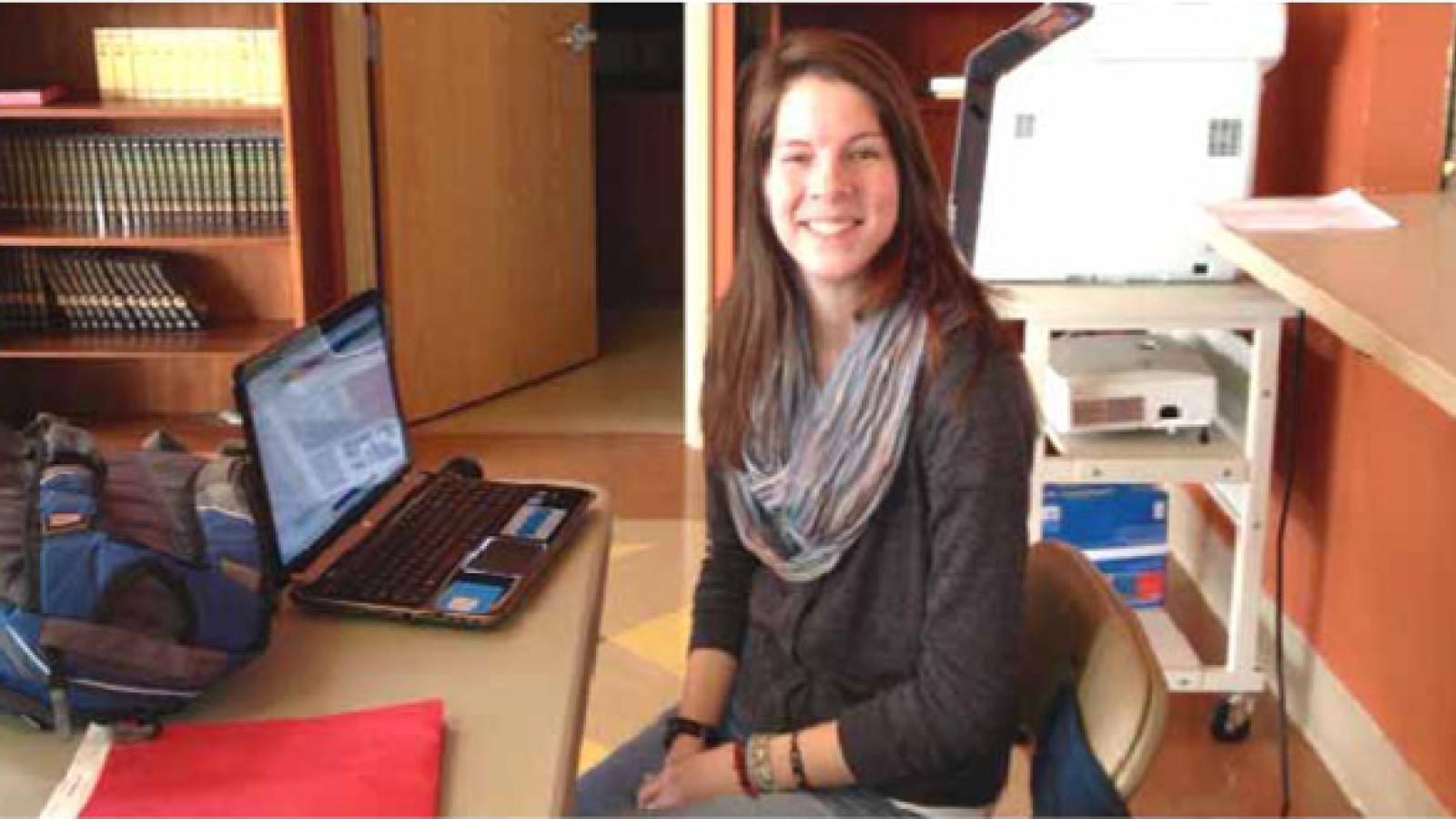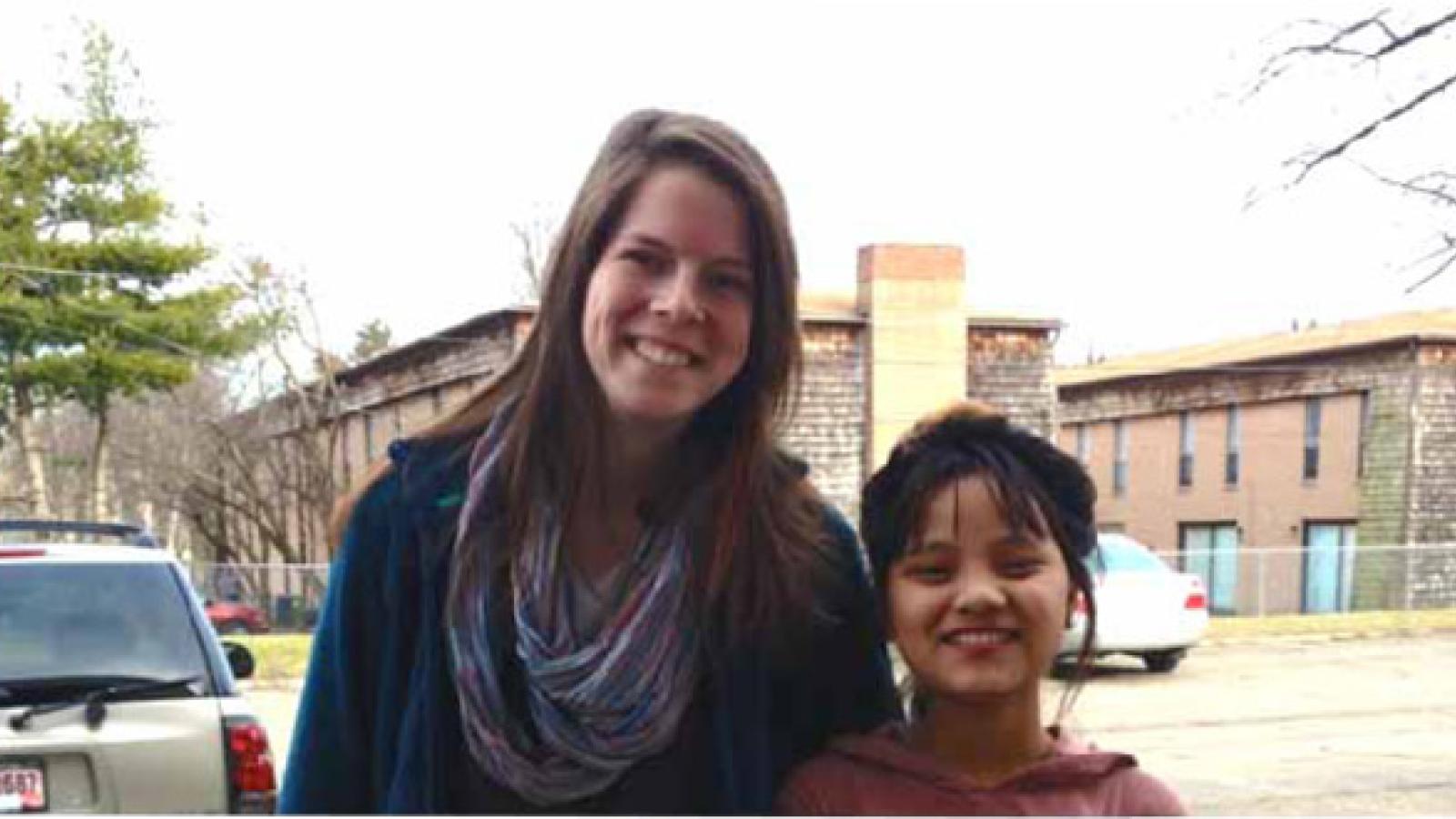It is a Small World After All: World Relief
Margaret Clemens is a junior majoring in Development Studies, with minors in Non‐Profit Studies, and Youth Development. She participated in an internship with World Relief. Here is her story.
“I’m sitting quiet and shoeless in a small apartment. I’ve just been served a large plate of grapes and a Fanta, the latter I sip as I watch a Nepalese movie playing in the background. All around me there are people chattering in Nepali, animated and with large smiles on their face. I can’t even begin to understand what they are saying, but every now and then I catch “Maggie” or “World Relief,” so I know at least some of it has to do with me. I catch the irony of the situation and smile at the humor; me, a white girl from the suburbs now sitting as the guest in a Nepali home, and it’s not even the first time this week. I don’t truly fit in here, yet there’s nowhere else I’d rather be.
I began as an intern in January of my sophomore year at World Relief, an international non‐profit organization with offices in 17 countries and 23 branches in the United States. They describe their vision as this: “In community with the local Church, World Relief envisions the most vulnerable people transformed economically, socially, and spiritually.” As a Christian organization, World Relief partners with local churches and organizations to “STAND FOR THE VULNERABLE;” this focus includes equal opportunities for children, women, the displaced, and the devastated.
Although World Relief is multifaceted within international aid, the Columbus office is solely focused on refugee resettlement. World Relief began under the name “War Relief Commission” in 1944, and since then has resettled more than 220,000 displaced, persecuted, and suffering refugees. In Columbus we’ve seen refugees from all over the world, mostly from Somalia or Nepal, and many with stories complicated both by bureaucracy and the language barrier. As they arrive and we move them into their new home I try to imagine what must be going through their minds: how did I get here? Interestingly enough, that’s exactly what I was thinking.
The road to my present begins with something that many believe belongs in the past: faith. Not everyone will agree with me, but I think it’s important to mention how I got to where I am now. The reason I desire to help the poor, needy, and suffering is because they are created beings, just like me, and there is a God who loves those who are hurting more than I ever will. In our society it is hard enough to live a life committed to serving other people, and harder still if behind each person you help is hundreds more that you cannot. The problem can be overwhelming, and even more so when the reality sets in that we’ll all eventually die, no matter what kind of life we’re living. A modern perspective today is that we should “love everyone,” but this has no basis if humans are simply biological processes who lack inherent value and will inevitably die. Value and purpose must come from an external source, a source outside our finite lives. We cannot help everyone, and for that reason I have to believe there is a God who can give us an opportunity for redemption, and did, with His son’s death.
I do not mean to preach, but I do hope to give context to my background and how I found myself at World Relief. My church, Xenos Christian Fellowship, has partnered with World Relief to provide employment, housing, and furniture for refugees resettled in Columbus. I’ve taken International Studies classes where refugee resettlement was mentioned but I did not know how to get involved or what organizations are doing the most good. I believe international aid should be sustainable, organic, removable in time, and ultimately address more than material needs. It needs to be personal, involved, and loving on an individual level. As I researched World Relief I was amazed how their ideology aligned seamlessly with mine, and I reached out to the volunteer coordinator.
That summer I was matched up with Safio, a Somali refugee, as a friend and English partner. We met weekly for an hour or so in her apartment for that summer. Now, Safio has a job, has completed ESL classes, and no longer needs a weekly partner. Working with Safio helped me realize my heart for the international refugee community and was the reason I was so eager to apply for an internship position at World Relief. It happened so quickly; I received the role of School Enrollment Liaison, set my schedule, and walked into the office on my first day completely unsure of what lay ahead.
As the School Enrollment Liaison, my official duties revolve around getting the refugee children enrolled in school. This is more complicated than I ever expected, involving numerous trips to the doctor for vaccinations and health screenings, meetings with the Columbus City School district, and mountains of paperwork. Once again, the language barrier only inhibits my communication with clients. This past Monday, I took a new 16-year‐old Nepali refugee to get her vaccinations at the Columbus Health Department. So far my experience with Nepali people has been thoroughly enjoyable; no matter what obstacles they face in the resettlement process, I have yet to see frustration, fear, or any hint of negative emotion. When I arrived in the Nepalese apartment for the first time, all 5 feet, 10 inches of me, I can imagine my initial impression might’ve been rather distressing for the extremely petite family (a relatively common trait among Nepalese people), but they smiled on as the young girl climbed into my car, trusting completely that she was in good hands. I cannot promise she knew where we were going or that it involved seven vaccinations, but she seemed unfazed by the awkward situation as we drove downtown, even attempting to make conversation with the little English she knew. At the Health Department I filled out the daunting pile of necessary paperwork and we waited in the lobby for an hour as the wheels of administrative bureaucracy slowly turned. Finally we were called up to the desk to answer a few questions before being taken into the back room to see the nurse and receive the vaccinations. Most of the questions were simple, not requiring much thought.
“Does the patient have any history of cancer?” “Does the patient smoke?” Both no. Then the woman asked, “Does the patient eat eggs?” and I had to pause, not sure of the answer. The woman behind the desk explained that because protein from eggs is used in the live virus vaccinations, an allergic reaction to eggs would have severe consequences. I looked down at the girl’s face and friendly smile, but her eyes betrayed her lack of understanding, and so I tried to ask if she’d ever eaten eggs.
“Eggs? Do you eat eggs? Like for breakfast?” She looked at me blankly as my eyes pleaded with her, begging for understanding, but there was none to be found. I tried creating an egg with my hands, even gesturing the action of breaking it open, but the girl did not comprehend. Feeling increasingly helpless I glanced around the room, wondering how far I was willing to go to make her understand. There were probably ten or so people in the waiting area, not counting the other employees at the desk, ten very good reasons not to act like a chicken in this public setting. Unfortunately, I saw no other option and slowly began to bend my elbows into wings and muster up a clucking noise. I was a millisecond from a chicken imitation that would easily seal my fate as a lunatic in the eyes of every uninformed bystander, when the woman at the desk had the genius idea to quickly pull up an image of an egg on her computer to show my client. The girl nodded and gave an affirming, “Yes, I like!” bringing an abrupt end to the matter. I slowly exhaled and relaxed my chicken-like stance, thanking God I avoided making an utter fool of myself.
Since beginning at World Relief no two days have been the same, and I’ve learned more than I could ever dream of. Culturally, I’ve learned that when entering a Nepali household it’s polite to take your shoes off , sit down, and accept any drink they offer, usually soda. Another helpful note, if you’re with a native Somali person it is impolite to give a thumbs‐up, as that is considered obscene. This wouldn’t normally be a problem, but I made the mistake of obsessing about this specific gesture (one that I rarely utilize) and was so tempted to use in front of Safio that I had to sit on my hands.
I strongly encourage anyone interested in International Studies or simply in helping people to acquire experience outside the classroom. Anyone can read a book on theory but it will never be the same as fully immersing yourself. With that in mind, when you’re looking for an internship, volunteer opportunity, or whatever you choose, I found it is imperative to remember three things. First, stick with your convictions: don’t compromise on what you know is important. We have the rest of our lives to make compromises, don’t do it when it comes to what you truly value as important. Fight for what you believe in, not what is easiest to fight for. Second, do the research. Did I know anything about Bhutanese refugee camps before this year? Not in the slightest, but I took the time to understand the people with whom I’d be working. This goes beyond just reading Wikipedia; don’t be afraid to ask questions! The more you protect your pride the less you’ll learn. Finally, be willing to get outside your comfort zone. I never imagined bowing and saying “Namaste” outside the context of a joke, nor did I think I would have to explain to a person who speaks minimal English what it means to be an organ donor. In case you were wondering, it’s actually very difficult to make organ donation not sound terrifying; “When you die, parts of your body goes inside someone else’s body.” Yikes. The point is, we all have a vision for what we want to do and who we want to be, but none of us know what it will take to get there. Maybe you’re like me, and you trust a higher power to provide the foundation, motivation, and ability to serve others. Or, maybe you’re relying solely on your individual drive, goodwill, and effort. Whatever the case, be willing to get outside of your ego and comfort zone to do something that scares you. I promise you will not be disappointed.
Earth is a big place. Huge. We all want to make a difference. Who knows where the journey will take us, but now, through the refugee community, the world is coming right here to Columbus, Ohio. As usual, Disney got it right: it is a “small world after all,” and as OSU students we are in a better position than most to welcome its arrival. In the end, it comes down to this well known phrase in the activist community: “When all is said and done, make sure more is done than said.”
Learn more about World Relief Columbus.


